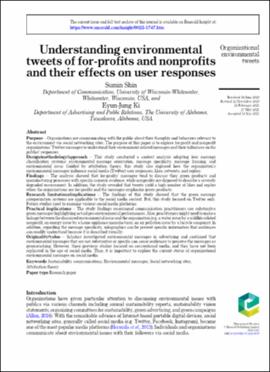| dc.contributor.author | Shin, Sumin | |
| dc.contributor.author | Ki, Eyun-Jung | |
| dc.date.accessioned | 2022-07-05T13:59:31Z | |
| dc.date.available | 2022-07-05T13:59:31Z | |
| dc.date.issued | 2021-07-27 | |
| dc.identifier | oksd_shin_understandingenvironmentaltweets_2021 | |
| dc.identifier.citation | Shin, S., & Ki, E.-J. (2021). Understanding environmental tweets of for-profits and nonprofits and their effects on user responses. Management Decision, 60(1), pp. 211-230. https://doi.org/10.1108/md-05-2020-0679 | |
| dc.identifier.uri | https://hdl.handle.net/11244/335908 | |
| dc.description.abstract | Purpose - Organizations are communicating with the public about their thoughts and behaviors relevant to the environment via social networking sites. The purpose of this paper is to explore for-profit and nonprofit organizations' Twitter messages to understand their environment-related messages and their influences on the publics' responses. | |
| dc.description.abstract | Design/methodology/approach - This study conducted a content analysis adopting four message classification systems: environmental message orientation, message specificity, message framing, and environmental issue. Guided by attribution theory, this study also explored how the organization's environmental messages influence social media (Twitter) user responses, likes, retweets, and replies. | |
| dc.description.abstract | Findings - The analysis showed that for-profits' messages tend to discuss their green products and manufacturing processes with specific numeric evidence, while nonprofits are disposed to describe a severely degraded environment. In addition, the study revealed that tweets yield a high number of likes and replies when the organizations are for-profits and the messages emphasize green products. | |
| dc.description.abstract | Research limitations/implications - The findings of this study showed that the green message categorization systems are applicable to the social media context. But, this study focused on Twitter only. Future studies need to examine various social media platforms. | |
| dc.description.abstract | Practical implications - The study findings recommend communication practitioners use substantive green messages highlighting actual pro-environmental performances. Also, practitioners might need to make a linkage between the discussed environmental issue and the organization (e.g. a water issue by a wildlife-related nonprofit, an energy issue by a home appliance manufacturer, an air pollution issue by a bicycle company). In addition, regarding the message specificity, infographics can be present specific information that audiences can readily understand because it is described visually. | |
| dc.description.abstract | Originality/value - Scholars investigated environmental messages in advertising and cautioned that environmental messages that are not substantive or specific can cause audiences to perceive the messages as greenwashing. However, these previous studies focused on conventional media, and they have not been replicated in the age of social media. Thus, it is important to explore the current status of organizational environmental messages on social media. | |
| dc.format | application/pdf | |
| dc.language | en_US | |
| dc.publisher | Emerald | |
| dc.relation.ispartof | Management Decision, 60 (1) | |
| dc.rights | This material has been previously published. In the Oklahoma State University Library's institutional repository this version is made available through the open access principles and the terms of agreement/consent between the author(s) and the publisher. The permission policy on the use, reproduction or distribution of the material falls under fair use for educational, scholarship, and research purposes. Contact Digital Resources and Discovery Services at lib-dls@okstate.edu or 405-744-9161 for further information. | |
| dc.subject | Behavioral and Social Science | |
| dc.subject | Clinical Research | |
| dc.subject | 1503 Business and Management | |
| dc.subject | 1505 Marketing | |
| dc.subject | 2202 History and Philosophy of Specific Fields | |
| dc.subject | Business & Management | |
| dc.title | Understanding environmental tweets of for-profits and nonprofits and their effects on user responses | |
| dc.date.updated | 2022-07-02T00:57:26Z | |
| osu.filename | oksd_shin_understandingenvironmentaltweets_2021.pdf | |
| dc.description.peerreview | Peer reviewed | |
| dc.identifier.doi | 10.1108/md-05-2020-0679 | |
| dc.description.department | Media and Strategic Communications | |
| dc.type.genre | Article | |
| dc.type.material | Text | |
| dc.subject.keywords | sustainability communications | |
| dc.subject.keywords | environmental messages | |
| dc.subject.keywords | social networking sites | |
| dc.subject.keywords | attribution theory | |
| dc.identifier.author | ORCID: 0000-0002-1774-1468 (Shin, Sumin) | |
